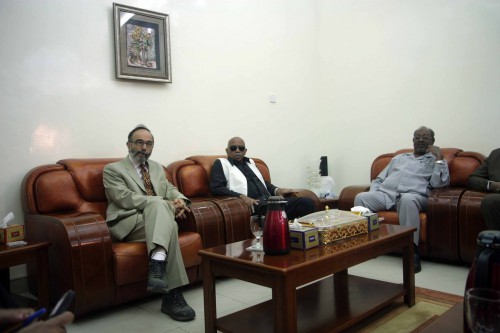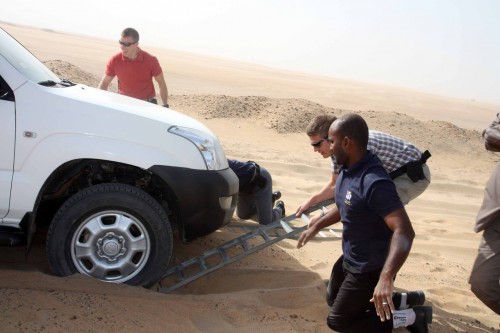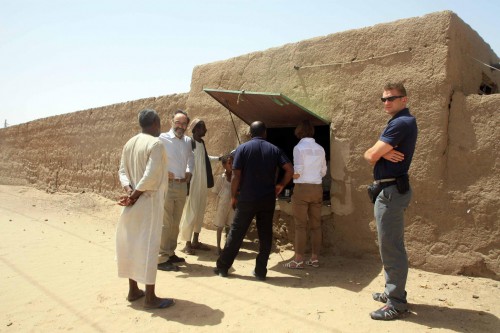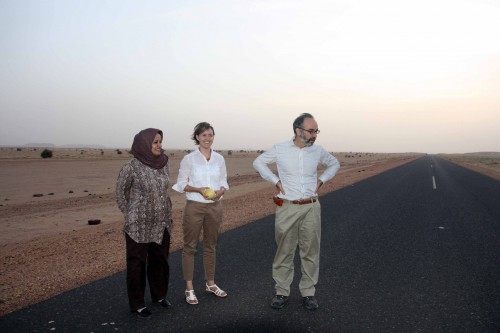26th March 2014
Travels in the North

I spent most of last week travelling in time and space in Northern and River Nile States. I visited a couple of archaeological sites. I was warmly hosted by the Governors and met a range of people in Dongola and Ed Damar. I visited an impressive investment project. There was some discussion of National Dialogue, although the news coming from Khartoum suggested that we have yet to see the creation of the kind of political environment that it needs to succeed.
The Past
I spent a day with Dr Neal Spencer from the British Museum and his team visiting the ancient Egyptian sites of Amara West and Sai on islands opposite Abri. Neal and his team offered great hospitality in their local dighouse and wonderful expert company. Amara is a fascinating complex of temple, administrative and residential rooms, and cemetery. It was apparently only occupied for a few generations before the drying up of the Nile channel made it uninhabitable, which is a lesson to all of us in how quickly and drastically environmental change can impact on us. There is more information about Amara West here.
Archaeology here has always struck me as a great example of cooperation between Sudan and the international community. The dig team is multi-national, including of course a Sudanese archaeologist from the National Corporation of Antiquities and Museums, and is largely funded by a very generous multi-year Qatari investment in Sudanese archaeology. The evident mutual respect and cooperation within the team, and the warm relationship between the team and the local community was impressive.
I visited Kerma on the way up to Amara, and a couple of weeks ago I was shown round the royal city of Meroe by another British archaeologist. There are so many fascinating sites in Sudan but very few Sudanese get to see them. The Sudanese authorities rightly recognise the potential for tourism but could do so much more to facilitate it (decent sign-posting would be an easy and very helpful start). Greater familiarity with Sudan’s rich past would surely help to build the common sense of shared and diverse identity that is so important for a peaceful and successful Sudan in the future.
On the more recent past, I had a rapid visit to the railway museum in Atbara, lovingly curated by railway enthusiasts. It’s part of British history too. The British built the railway system here. Much of the old rolling stock in the museum was built in the UK. It’s good to know that the railway is again benefiting from investment after a long period of neglect.
The Present
I spent 3 days in Dongola and Ed Damar/Atbara meeting with the Governors, business communities, civil society, opposition parties, the church, university and so on. All were very welcoming. Northern and Red Nile States have been favoured with infrastructure investment (Meroe, roads) and the benefits are plain to see, not least for example, in getting agricultural produce to market.
But the States still face major challenges: small populations in large land masses, shortage of resources for the provision of health and education services, the lure of nearby Khartoum. Both States understandably see part of the answer in more foreign investment and I was pressed for more UK investment, given our history here. But these are commercial not political decisions and the onus is on Sudan to create and promote an attractive investment offer.
The Future
There is already significant foreign investment. It is a cliché that Sudan could be the bread basket of the Gulf. But after visiting a major Qatari agricultural investment project I recognised the reality in the cliché. Sudan has the crucial inputs (land, water, sun) and the economics of the investment sound very attractive. Local villagers said the project brought jobs, better roads and a new school.
And if that is the economic future for Sudan, then perhaps National Dialogue will deliver a political future. Lots of people were talking about it during my visit. But as I was travelling I was getting news of the disruption of an event to mark International Women’s Day, the suspension of newspapers and the dispersal of university protests. It’s hard to see how National Dialogue can achieve the ambitious objectives set for it against that kind of repressive backdrop.



Dear
Mr.Peter Tibber
Greeting
Thanks for this wonderful article, The areas you have visited are rich in many of the great historical relics, and may extend the age of some of the relics to a thousand years BC..Unfortunately, there is little of the Sudanese who know the history of this great monuments..Through this visit, I would suggest that you make a personal initiative to revive the cultural heritage of these areas that you have visited.. Me and a group of interested antiquities Sudanese we can be part of this initiative…Bregards
faithful
Dr.Daffalla A’lam Elhuda
Acdemy of health Sciences
Federal Ministry of Health
c.PHONE:00249912389333